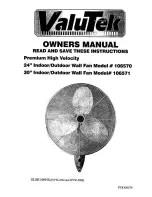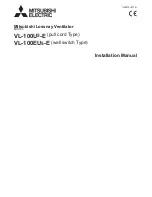
page 3 of 5
An in situ assessment must be conducted of the heating behavior
(appropriate and inappropriate operation), the protection against
contact, electrical shocks, impact of foreign objects or water and the
usage at altitudes higher than 2000 meters.
Contact ebm-papst if you have specific queries regarding the product.
3
TECHNICAL DATA
Drawing, see annex
Technical description
Airflow direction
Air intake over struts
Rotational direction
looking at rotor
clockwise
Frequency
50 Hz
60 Hz
Nominal voltage
115,0 V
115,0 V
Current consumption
230 mA
210 mA
Power consumption
19,0 W
18,0 W
Nominal voltage
Current consumption
Power consumption
Speed
2.650 1/min
3.100 1/min
Max. free-air flow
148,0 m3/h
178,0 m3/h
Weight
0,550 kg
Protection class
I
Max. torque when
mounted across both
mounting flanges
wire outlet corner: 190 Ncm
remaining corners: 310 Ncm
Screw size
ISO 4762 - M4 degreased,
without an additional brace and
without washer
The product is intended for use in sheltered rooms with controlled
temperature and controlled humidity. Directly exposure to water must
be avoided.
Pollution degree 1 (according DIN EN 60664-1)
There is either no pollution or it occurs only dry, non-conductive
pollution. The pollution has no negative impact.
Ambient conditions
Permitted ambient temperature
Transport and storage
Operation
50 Hz
60 Hz
-40 °C ... 100 °C
-40 °C ... 80 °C
-40 °C ... 90 °C
Vibration and shock load
At stationary operation:
sinus vibration
1,0 g; 5 - 500 Hz; 3 x 1 sweep
(Resonance search run)
Noise
0,5 m2/s3, 10 - 50 Hz; +12
dB/oct f. 5 - 10 Hz; -12 dB/oct f.
50 - 100 Hz; 3 x 30 min
Repetitive shock
Half sine; 5 g, 11 ms; 6 x 100
shocks
Transport and storage:
Noise
2,0 m2/s3, 5 - 20 Hz; -3 dB/oct f.
20 - 500 Hz; 3 x 30 min
Thrusts
Half sine; 18 g, 6 ms; 6 x 100
shocks
Do not operate your product in the resonance range.
4
CONNECTION AND COMMISSIONING
Connect mechanical parts
CAUTION
Risk of cutting/squashing when
removing the product from the
packaging and during mounting.
Grasp the housing and lift the product
carefully out of the packaging. Avoid
impact.
Wear safety boots and cut-resistant
gloves.
Connect electrical parts
Connect to the mains after installation.
DANGER
Do not touch. Risk of fatal injury
from electrical current.
Ensure that the electrical lines are
de-energized.
Secure the operating voltage against
switching on again.
Never work on parts that are
energized. Only allow skilled
electricians to work on the product.
DANGER
Compliance with the electrical
installation regulations
Observe the connection regulations
that are valid in your country. (e.g.
fusing, GFCI)
CAUTION
Electrical voltage
The product is a built-in
component and has no switch for
disconnecting power.
Only connect the product to
current circuits that can be
switched off by a switch (all poles
disconnected). When working on
the product, secure the
system/machine in which the
product is installed against
switching on again.
NOTE
Electromagnetic compatibility (EMC) may affect the system integration
of the product due to interaction.
Ensure the electromagnetic compatibility of the entire system.
Ground fault interrupter GFI
Only current-sensitive GFIs (type B)
are permissible. Personal protection is
not possible with GFIs when the
product is in operation (see also
frequency converters).
Requirements:
- Before connecting the product, ensure that the supply voltage
corresponds with the product voltage.
- Check whether the data on the nameplate corresponds with the
interface data.
Содержание 4606 N
Страница 5: ...page 5 of 5...























